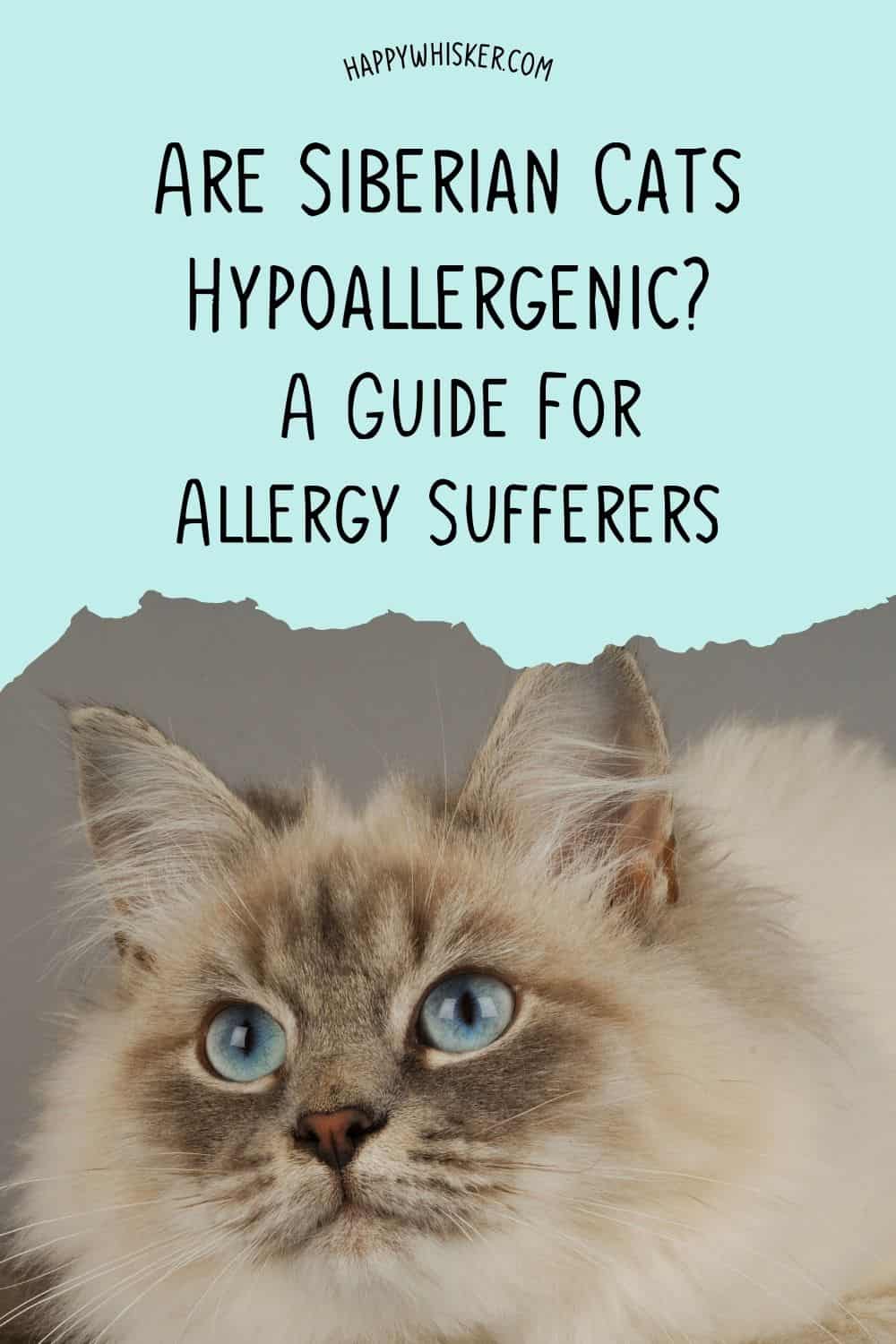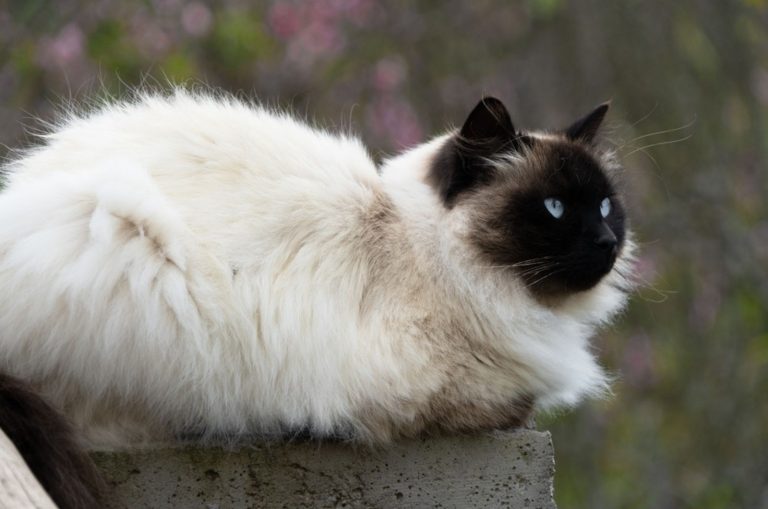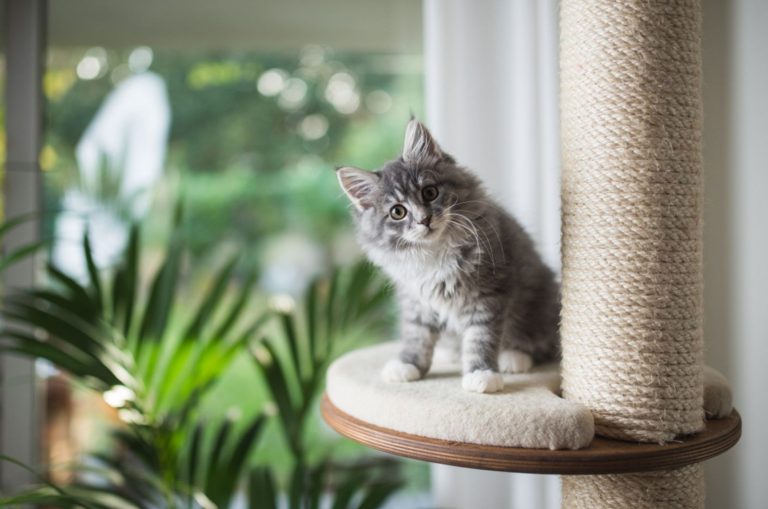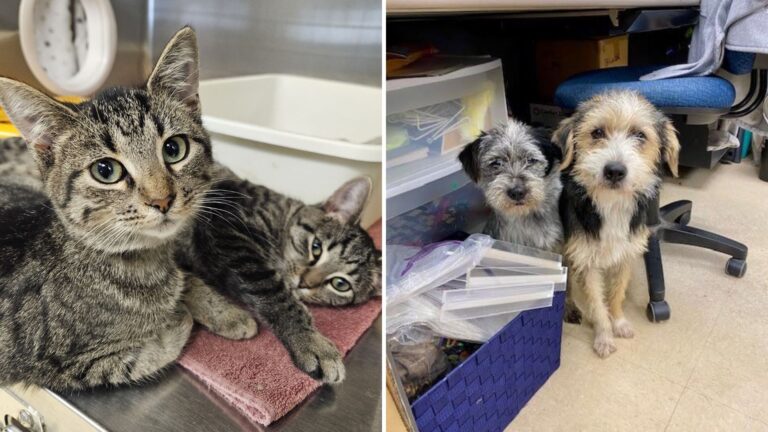Are Siberian Cats Hypoallergenic? A Guide For Allergy Sufferers
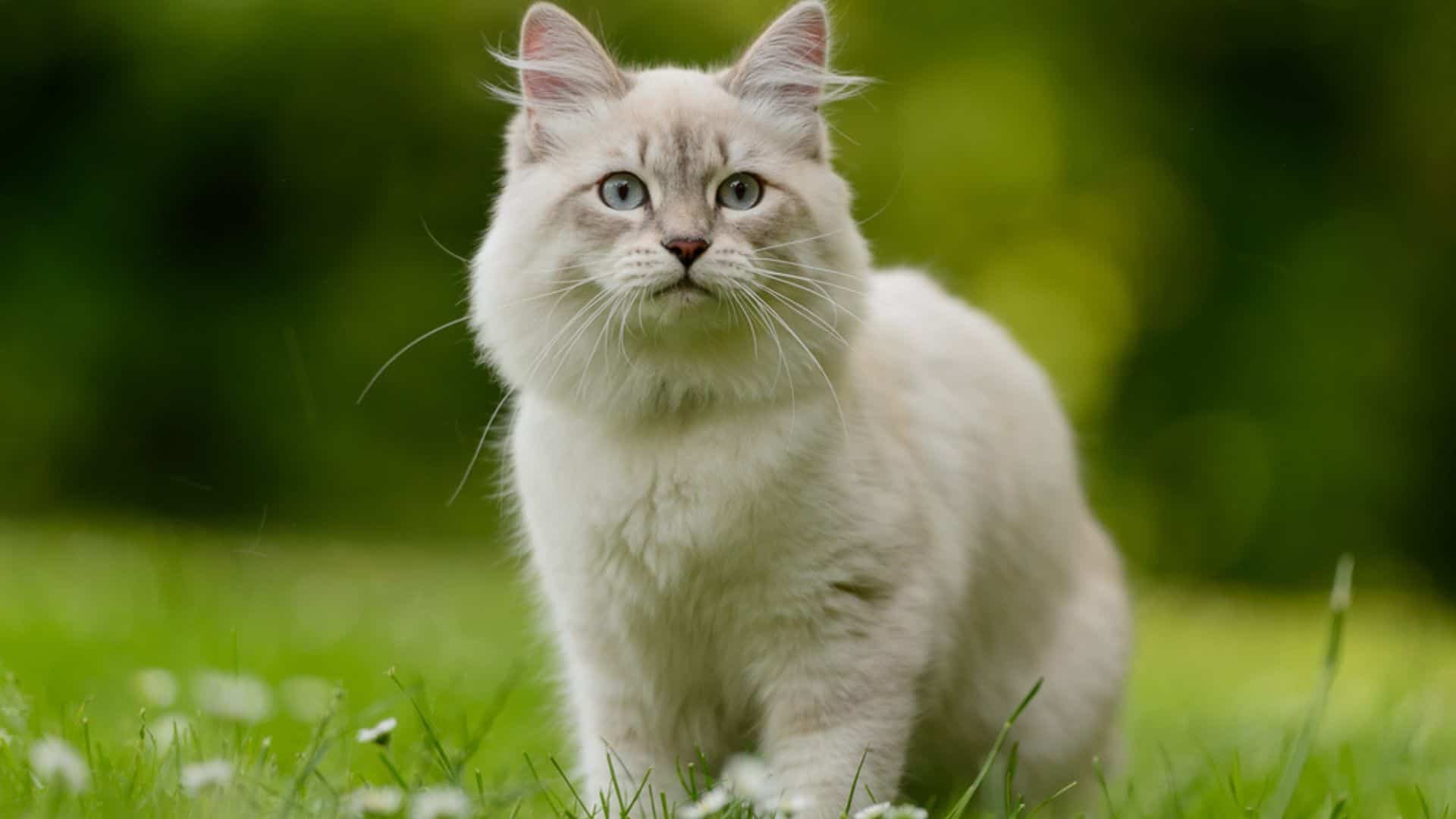
The Siberian Forest Cat is the national cat of Russia that originated from Siberia. The breed is popular for its long, weatherproof coat that enables them to survive long, cold winter months.
However, their coat isn’t only popular for this. Even though they have long, thick fur, you may be surprised that these cats have a low amount of shedding. So, with regular brushing and occasional baths, it’s very easy to maintain their fur.
But what interests people the most is: are Siberian cats hypoallergenic, and if yes, what makes them so? Is it their fur or something else?
If you’re an allergy sufferer looking for the perfect cat breed to suit your lifestyle, then you should keep reading and find out more about Siberian cats.
Are Siberian Cats Hypoallergenic?
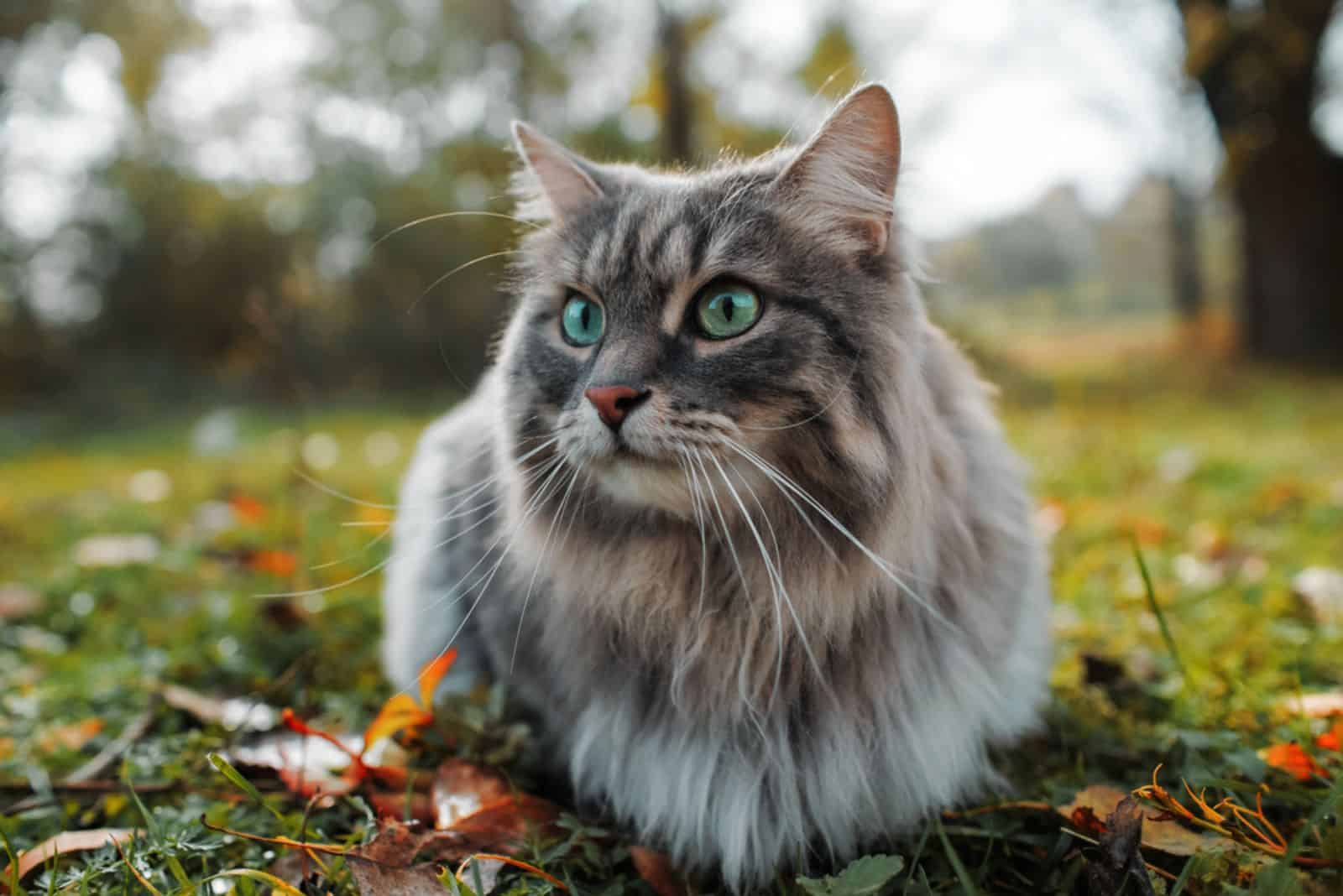
If you wonder are Siberian cats hypoallergenic, you might be surprised to see them on the list of potentially hypoallergenic cat breeds.
Some cat breeds are considered to be hypoallergenic due to the lower amount of shedding and lower production of the protein Fel d1, which is the main trigger for cat allergies.
Fortunately, the majestic Siberian cat breed is regarded as hypoallergenic. But how and why? Let’s find that out further on in the article.
The Main Cause Of Allergic Reactions
A cat’s saliva, urine, and skin all contain the protein Fel d1, which is responsible for causing allergic reactions in humans.
Some cats have high levels, and some have low levels of this protein, meaning that there’s a lower risk of having allergic reactions around the cat with lower production of Fel d 1.
When cats groom themselves, they lick their fur. After that, the cat’s skin starts to create dander, which is made of the Fel d1 protein. When cats shed, dander is released from their fur and circulates in the air and around your home.
Moreover, the Fel d1 protein has also been discovered in a cat’s urine. Therefore, if you wish to prevent respiratory issues or other allergies, be sure to clean the cat’s litter box and replace the litter more frequently.
Why Are Siberian Cats Considered To Be Hypoallergenic?
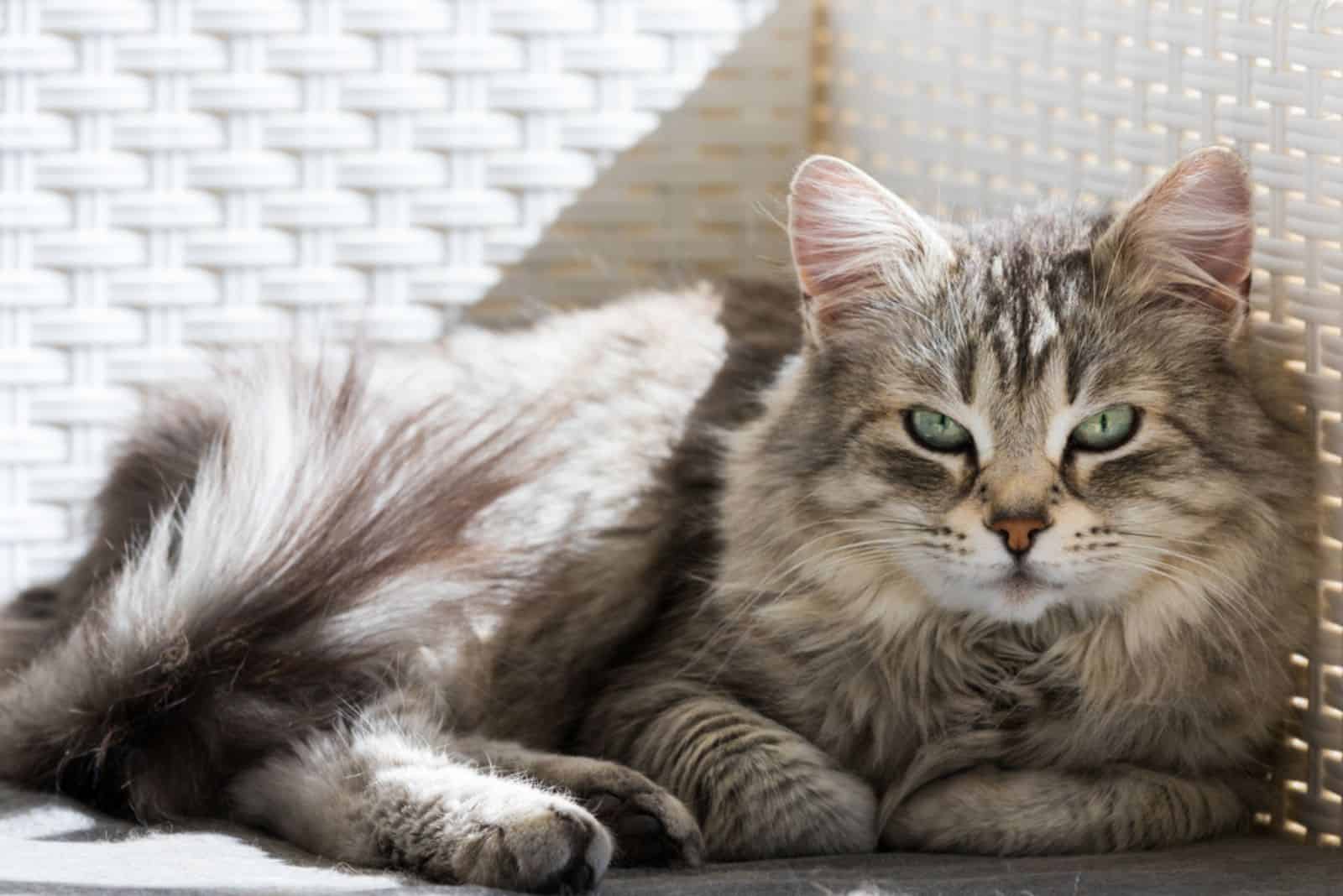
Siberian cats have long, thick fur, and most people will think they’re not hypoallergenic because of that.
However, the protein that most cats produce, known as Fel d 1, is what causes allergies in people, not the cat’s fur.
There’s no such thing as hypoallergenic cat breeds; however, some cat breeds produce lower amounts of the protein that causes allergic reactions.
One of the breeds that also has a lower production of Fel d 1 is the Siberian cat. According to some research, 75% of allergy sufferers do not respond to Siberian cats, making them one of the most hypoallergenic cat breeds.
What’s even more, male cats usually produce higher allergen levels, and Siberian male cats produce way less, which makes them perfectly suitable for people with cat allergies.
Of course, people with severe cat allergies may still react to these cats as some may still have high allergen levels. However, the risk is lower when compared to other cats that produce higher amounts of protein Fel d 1.
Siberian Cats And Grooming Care
Siberian cats are characterized by their long, thick coat. Their triple coat is water-resistant and helps them maintain their body temperature, especially during cold months.
Moreover, their coat doesn’t shed a lot which is perfect for people with cat allergies. Still, you can expect them to molt more during the shedding season.
When it comes to grooming, you need to pay special attention. These long-haired cats need regular brushing, at least three times a week, to prevent their coat from tangling.
That way, you’ll also reduce the amount of dander spreading around your environment, creating an allergy-free surrounding.
Most Common Symptoms Of Cat Allergies
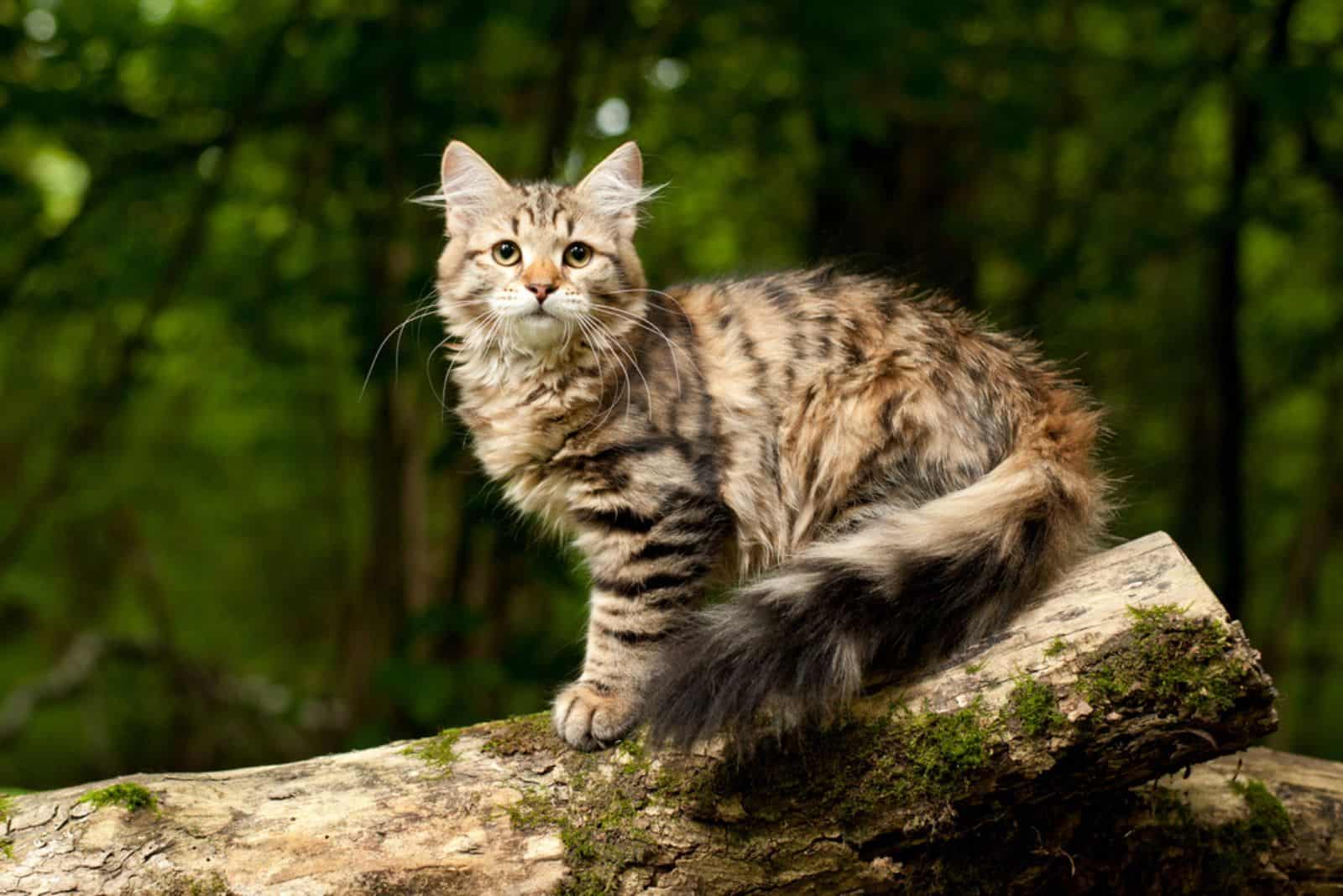
If you often experience some of the following symptoms when you’re around your or someone else’s cat, you should consult your doctor on what you should do next.
Symptoms of cat allergies include:
• Watery eyes
• Coughing
• Sneezing
• Red eyes
• Itchy eyes
• Skin irritation
• Runny nose
• Congested nose
• Respiratory issues or anaphylaxis (only in severe allergies).
However, if you own a cat, you’ll likely need to make a few lifestyle adjustments if you want to keep your feline companion.
It can be more difficult if you have severe allergies. But, with the right therapy and a qualified veterinarian, both you and your cat should be OK.
10 Ways How To Reduce Cat Allergens
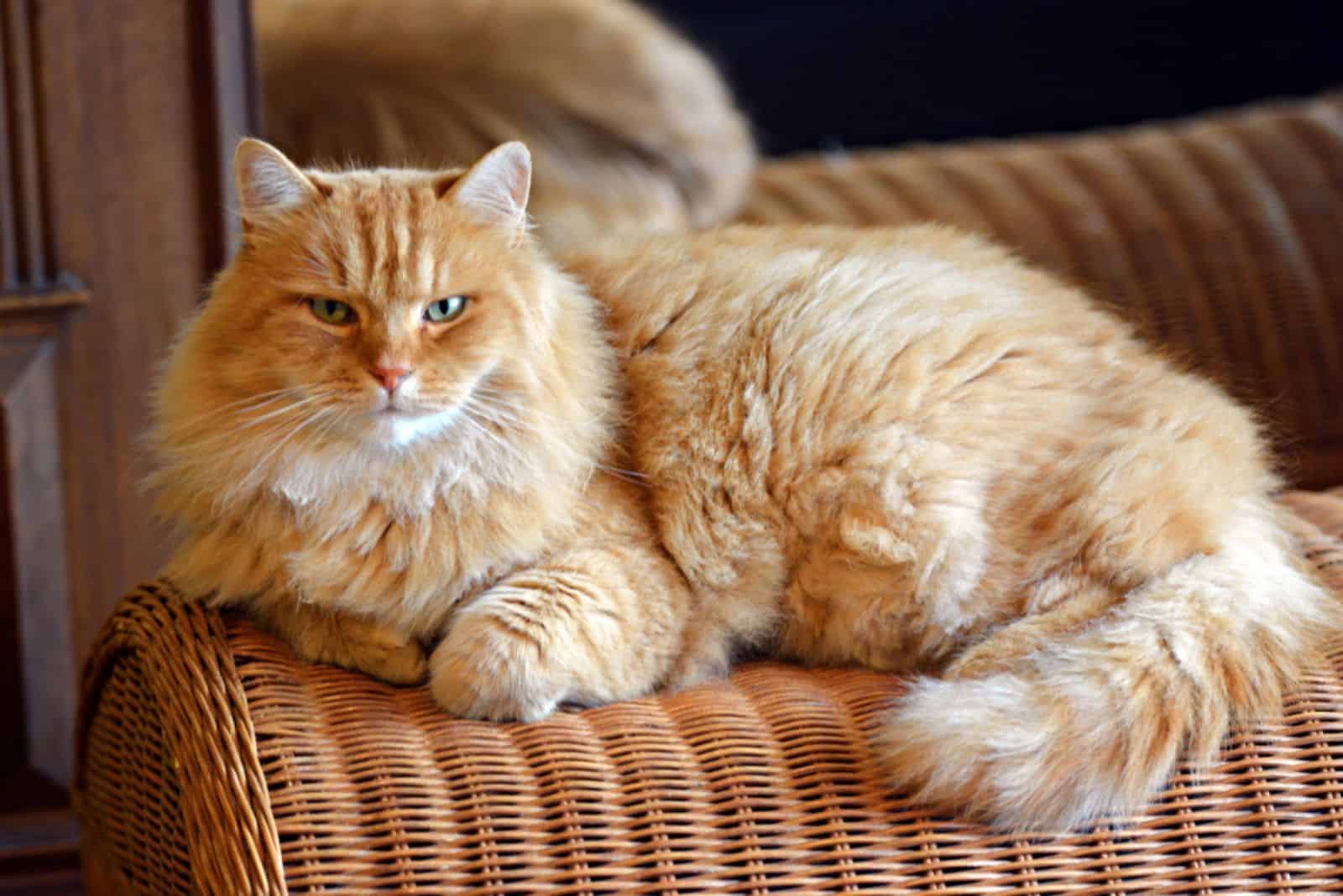
If you are or want to become a cat parent, but you also have cat allergies, then you should keep reading to find out how to live peacefully with your feline friend in an allergy-free environment.
Moreover, if you’re looking for the perfect cat for you, then check out the list of possible hypoallergenic cat breeds, and choose the best one for yourself and your needs.
1. Brush Your Kitty Often
Whether you have allergies or not, grooming is a crucial component of cat care. By regularly brushing your cat, you can reduce the possibility of allergic responses by reducing the amount of shedding of your cat’s coat.
As a result, regular brushing will help your cat reduce the frequency of self-grooming, which is crucial for you if you have cat allergies.
2. Provide Your Cat With Regular Baths
Bathing the cat frequently will help to reduce the amount of dander and oils on the cat’s skin that might trigger allergic reactions.
With regular baths, your cat’s coat will be perfectly healthy and clean. Additionally, you’ll help the cat by removing loose hair, thereby lowering the amount of hair your cat sheds.
3. Feed Your Cat Top-quality Food
The cat’s nutrition should also be taken into consideration if you wish to reduce allergies. A cat’s general health depends on it, and your health and the environment also depend on it.
A healthy diet will lead to a healthy cat’s skin and coat; thus, a cat has to eat a healthy, balanced diet.
With the right diet, cats may shed less and get fewer hairballs, especially if they eat food that has a special hairball formula.
This is crucial because cat saliva in their hairballs may potentially trigger allergic reactions.
4. Wash Your Hands Often
If you don’t want to experience certain allergic reactions, then you need to pay special attention to keeping your hands clean. So, after every encounter with your kitty or its things, you should thoroughly wash your hands.
After interacting with your cat, you should be careful not to touch your face, especially your eyes, nose, or mouth.
5. Keep Your Home Clean
You need to clean your environment often if you want an allergy-free house. You should vacuum your home at least once a day to get rid of as much cat hair as possible.
Make sure to vacuum every area of your home, paying special attention to your cat’s favorite areas. Additionally, you should wash any blankets or similar items that your cat likes to rest on, as well as all the flat surfaces.
For your own sake, or if you suffer from severe allergies, it would be better to have someone who will keep your home clean for you.
6. Filtrate The Rooms Often
The easiest method of reducing allergies is to filtrate your environment regularly. You’ll bring in new air and get rid of any potential allergens by doing this.
7. Get A HEPA Air Filter
A High-Efficiency Particle Air (HEPA) filter is the device that every cat owner with allergies should own.
The best part about this device is that it traps all airborne allergens, including skin flakes and hair, and keeps them from escaping. With that device, you’ll be able to live in an allergy-free environment.
8. Isolate The Cat
In order to reduce the risk of allergies, you can try isolating your cat. So, limit your kitty’s movement; by doing that, you’ll prevent it from shedding and leaving its hair everywhere around your home.
It’s especially important not to let your cat in your bedroom, especially to lay or walk on your bed where you sleep, as that may result in severe allergy reactions.
9. Keep The Cat’s Litter Box And Litter Clean
As a cat’s urine also contains the protein Fel d1, that means you need to pay more attention to the cat’s litter box.
So, if you want to control your allergies and keep the environment allergy-free, then ensure you change the cat’s litter often and wash the litter box carefully before putting in a new litter. It’s even better if someone else can do this task for you.
Another important thing is to pick a special location for the cat’s litter box. It would be best to put it in a small room that will be only for your cat. However, make sure that the room and litter box have easy access to avoid possible mess around your home.
10. Ask Your Doctor For Advice
The most crucial step when suffering from cat allergies or any other kind is to speak with your doctor. Sticking to your doctor’s orders is crucial because you shouldn’t treat allergies by yourself.
If you have minor allergies, your doctor can recommend some antihistamines to help you manage them.
Although there is no real cure for allergies, different medications and therapies may make it easier for you to manage your symptoms.
Other Possible Hypoallergenic Cat Breeds
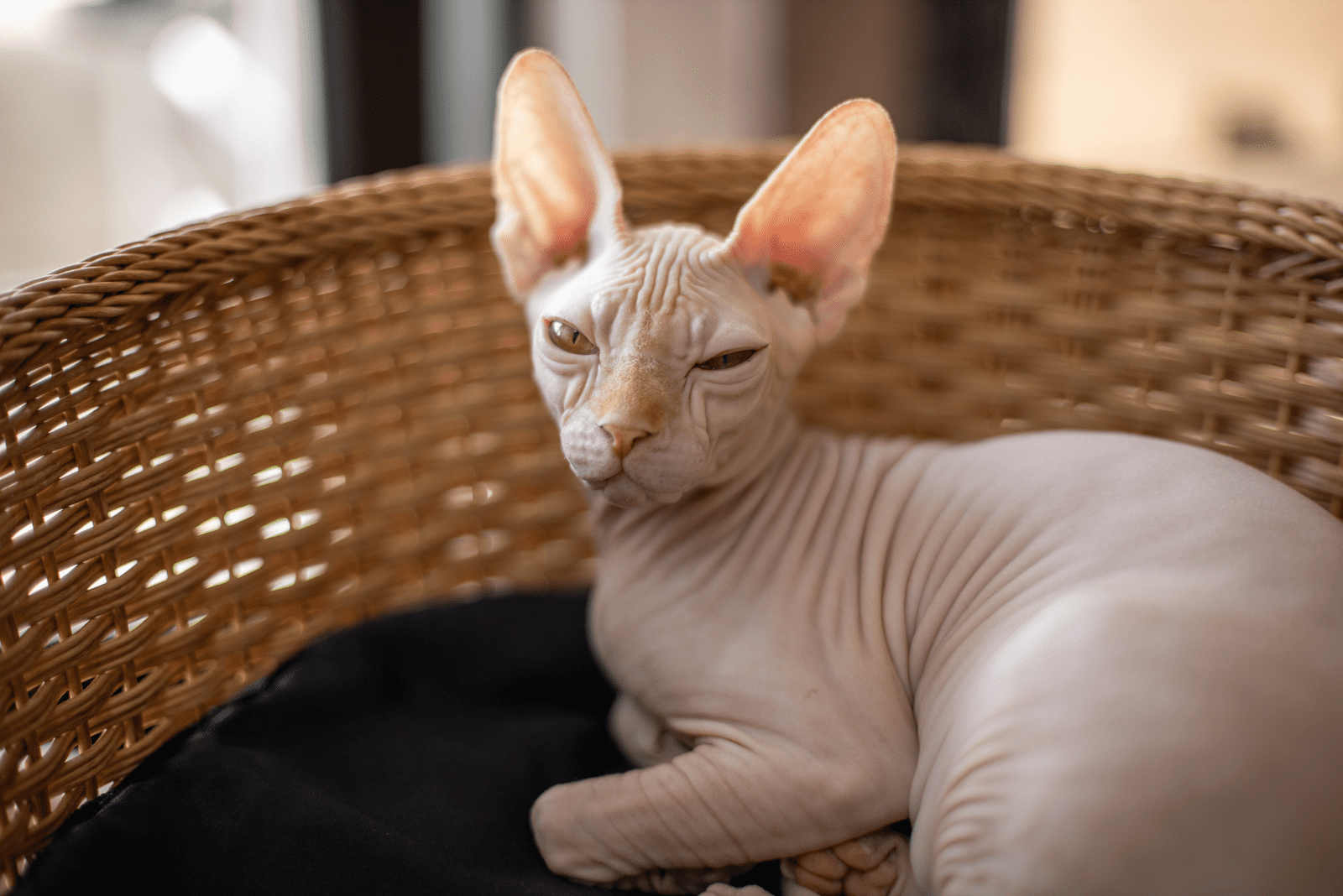
• Devon Rex – These cats require little maintenance attention due to their short coats. They are the ideal feline pets for allergy sufferers since they have low-allergen levels and shed less than other cats.
• Cornish Rex – Just like Devon cats, Cornish Rex are short-haired cats that have minimal shedding and lower production of the Fel d 1. Because of this, with the right grooming care, these cats can make the purrfect pets for persons with different sensitivities.
• Sphynx cat – Most people think that Sphynx cats are hypoallergenic because they’re hairless. However, what makes these cats hypoallergenic is low shedding and lower production of Fel d 1. Compared to some cat breeds with longer coats, these hairless cats need more grooming attention.
• Oriental Shorthair Cat – these cats are distinguished by their short fur. They don’t produce as much dander and need to be groomed more frequently to keep allergic people safe.
• Javanese (Balinese) Cat – the lack of an undercoat is what makes these cats hypoallergenic. In contrast to other cat breeds, Javanese cats create fewer allergens and pose a low risk of allergic reactions.
• Burmese cats – these cats may be hypoallergenic because they tend to trigger fewer allergies than other cat breeds.
• Russian Blue cats – these cats are thought to be hypoallergenic due to their short hair, minimal shedding, and small amounts of dander.
As these cats may be perfect pets for allergy sufferers, there are other cats that should be avoided due to the higher production of allergens. Such breeds are Maine Coon, Persian cats, Norwegian Forest cats, Himalayan, and similar breeds.
FAQ
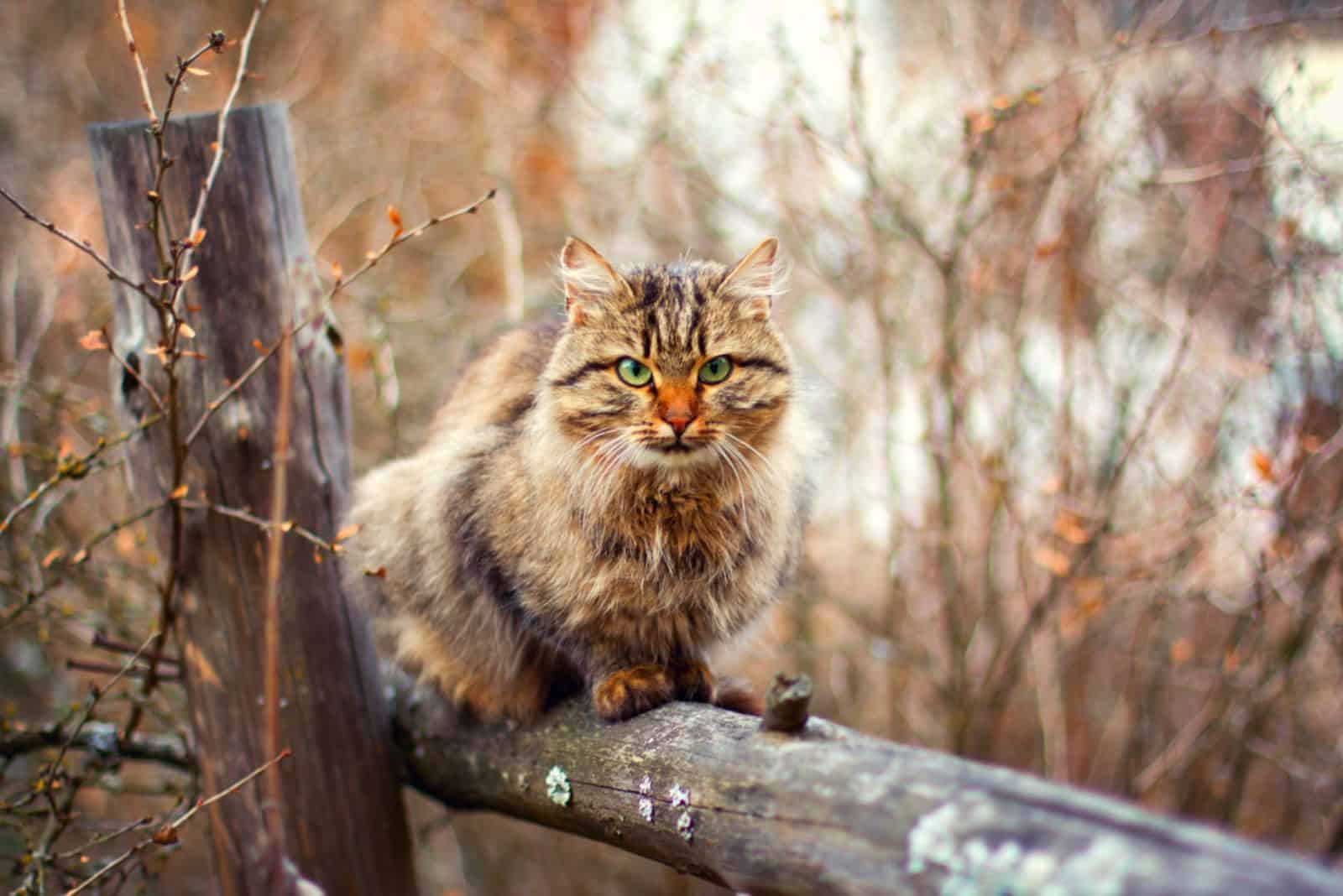
Can I Get A Siberian Cat If I’m Allergic?
If you have mild cat allergies, a Siberian cat can be your perfect furry friend. This cat breed is considered to be closest to hypoallergenic cats as they produce minimal amounts of protein Fel d 1 that triggers allergic reactions.
However, it’s important to consult with your doctor first and to test that by spending some time with such a cat.
Do Hypoallergenic Siberian Cats Shed?
Usually, long-haired cats shed a lot; however, that’s not the case with Siberian cats. They don’t shed a lot and that’s great for allergy sufferers.
With less shedding, your Siberian kitty will also produce lower amounts of dander around your environment.
However, if you want to reduce possible allergens and keep the cat’s coat in good condition, you need to brush the Siberian cat often.
Are Siberian Cats Good Pets?
If you’re looking for a social and friendly feline, a Siberian cat is a perfect choice for you, especially if you’re a first-time cat parent. These cats are very playful, lovely, and intelligent and cannot get enough cuddles.
They adore interacting with their humans. They’re extremely friendly, which means they get along well with everyone, even with children and other pets.
What Health Issues May Siberian Cats Have?
Siberian cats are healthy cats in general. However, there are some health issues linked to the breed, as most cat breeds have. Therefore, Siberian cats may have problems such as:
• Hypertrophic cardiomyopathy (HCM)
• Hereditary cancer
• Periodontal disease
• Polycystic kidney disease (PKD)
What Is The Lifespan Of A Siberian Cat?
You can expect to have a nice long life with your Siberian feline friend, as these cats may reach a lifespan of 12-15 years.
All In All
Although there are no truly hypoallergenic cat breeds, some breeds can be found on the list of possible hypoallergenic breeds due to the lower production of the protein Fel d 1, which is the main trigger for allergic reactions.
One of the best hypoallergenic cat breeds is the Siberian cat. But why are Siberian cats hypoallergenic?
The main reason why Siberian cats are considered hypoallergenic is that they don’t shed a lot and have low production of the protein Fel d 1 that triggers allergic reactions in humans.
According to the research, around 75% of allergy sufferers won’t react to these cats at all. However, allergic reactions are still possible as they’re not 100% hypoallergenic.
So, if you’re looking for a hypoallergenic breed, then a Siberian cat is a perfect choice in most cases. Still, you need to pay more attention to certain things in order to reduce the risk of allergies and enjoy your allergy-free home with your furry friend.
Related Articles
• Are Bengal Cats Hypoallergenic? Here’s What You Need To Know
• Are Calico Cats Hypoallergenic? Everything You Need To Know
Like this post? Share or pin it for later!
